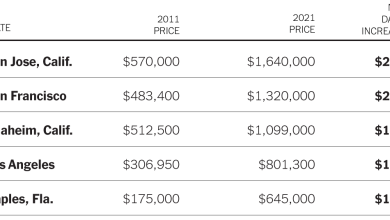Moving? Here’s How to Keep Your Costs Low.

Jeff Moriarty felt the pain of sticker shock when he received six quotes from movers for an April move from Naperville, Ill. to Aurora, Ill. “I had previously moved a few years ago and the cost was double what it was then,” said Mr. Moriarty, a digital marketing consultant.
To reduce his expenses, he decided to move on his own. “I rented a truck, had two buddies help me, and we did it in about a half day,” Mr. Moriarty said. “Total costs were $155 for the truck and about $100 worth of boxes.”
Many Americans who are hiring professional movers are feeling the sting of higher costs. In August, the average cost of a local move in the United States reached a record high of $454, up 12 percent from a year ago, according to an analysis by the online marketplace HireAHelper of about 50,000 local moves booked through the site and its partners in the first eight months of this year. Some people are paying a lot more than that, depending on how much they’re moving and how far they’re going.
This year, the median cost of moving a one-bedroom apartment from New York City to Miami is $3,546.60, up from $3,212.50 in 2021, according to moveBuddha, a site based in Athens, Ga., that compiles data on professional moves.
Several factors are driving up prices. For starters, more people are packing their bags: The Postal Service received 36 million address changes online in 2021, up from roughly 20 million in 2020, the agency reports.
As a result, demand for movers is high. From last summer to this summer, there was a 55 percent increase in local New York City moves booked with less than 24 hours’ notice, according to data from the moving company Piece of Cake, based in New York. Inflation is also causing movers to raise their prices.
That’s not all: “There are some pressure points for movers that are driving costs for consumers, said Ryan Bowley,the executive director of the Moving and Storage Conference of the American Trucking Associations, a national trade group based in Washington. That includes “the shortage of truck drivers and of on-site labor to conduct moves, as well as increasing costs for materials used to package and move household goods, including cardboard and wood crating,” he said. “As these costs rise for moving companies, they are partially passed on to consumers in the form of higher rates.”
The good news? There are ways to trim your moving costs, whether you’re hiring a professional or doing it yourself.
Time Your Move Right
Timing affects moving rates, said Nancy Zafrani, the general manager at Oz Moving & Storage, based in New York City. “There is a higher demand when leases are expiring,” she said. Because most leases expire at the beginning or end of the month, Ms. Zafrani said consumers could save money by moving in the middle of the month. “Off-peak discounts are common,” she said. “We offer more incentives and deals during the slower days and show more flexibility with pricing.”
Ms. Zafrani’s advice? Ask for quotes for a few different days and different times of day; these two factors can affect a moving company’s willingness to negotiate rates, she said.
Shop Around
Obtaining quotes from several movers can help you find a competitive price. Start by getting recommendations from friends and family. You can also shop around on sites like moveBuddha, Moving.com, Move.org and Unpakt.
Thoroughly vet companies by checking references, reading online reviews and reviewing any complaints against the company through the Better Business Bureau. Nick Mueller, the director of operations for HawaiianIslands.com, which offers luxury beach rentals in Hawaii, said he learned a hard lesson when he hired a mover a few years ago.
“I made the mistake of hiring a cheap moving company off Craigslist,” he said. “It was clear from first sight that their truck was in poor repair, but at that point I needed to be out of my rental and didn’t have time for other options. After driving 18 hours through spring rainstorms, almost every single box in the truck had water damage, and many items inside were ruined.”
Don’t Be Afraid to Negotiate
Haggling may lead to a lower price. “Most moving companies are small to medium-size organizations and are open to negotiations,” Ms. Zafrani said. The higher the price of your move, the more leverage you have, she added. If the mover won’t budge on the rate, Ms. Zafrani suggests asking for freebies, like free boxes or free TV mounting at your new home.
Negotiating paid off for Laurén Green when she moved from Los Angeles to Pasadena, Calif., in June. Several moving companies asked Ms. Green, a training and development coordinator at a law firm, to pay a per-mile premium to compensate for rising fuel costs. “I ended up negotiating with multiple moving companies,” she said. “Eventually, I circumvented the surcharges by agreeing to a minimum three-hour flat rate of $150 per hour instead of paying premiums on per-mile charges.”
Find Free Boxes and Moving Supplies
Moving companies charge extra for boxes, plastic wrap, tape and other packing supplies, so you’re better off getting moving materials on your own. That’s what Blake Young did when he moved in July from San Francisco to New Orleans. Mr. Young, a registered nurse, received free boxes from work, grocery stores, a bar and a neighbor who had recently moved into his apartment building. Facebook Marketplace, Buy Nothing groups and Craigslist can also be good sources for free moving supplies.
Get a Contract in Writing
Many local movers charge by the hour. Long-distance movers, on the other hand, set rates based on the distance and weight of the move, said Ryan Carrigan, a co-founder of moveBuddha, the company that collects moving data. Either way, make sure you get a written contract that states the terms of the move, including taxes and fees. Mr. Young, who moved from San Francisco to New Orleans, said he received a moving estimate, but the company charged him an extra fee later, since the movers had to climb a flight of stairs to reach his apartment.
Take Advantage of Your New Employer’s Relocation Assistance
If you’re relocating for a new job, the company may help you foot the bill. In a survey by the U.S. moving company Allied Van Lines of 1,000 workers who recently moved for a job, roughly 64 percent said they received some sort of relocation expense package from their employer.
Courtney Durham, a social media manager, and John Durham, a supply-chain analyst, used Mr. Durham’s employer-provided relocation assistance to help offset their moving expenses when the couple moved with a newborn in June from Omaha to Atlanta. “Before even looking for jobs outside of where we were previously located, we knew we could only afford it if relocation assistance was offered,” Ms. Durham said.
Downsize Your Possessions
Planning to haul a ton of stuff to your new home? Now is the time to pare down furniture and belongings that you no longer need or want. Dalton Allen, the owner of a venture capital firm,said he “Marie Kondo’d” his life — referring to the popular Japanese organizing consultant — when he moved with his fiancé in June from Napa, Calif., to Santa Barbara. “I donated, sold or trashed 90 percent of everything I owned, only keeping the most important items,” he said. “It eliminated an incredible amount of stress and cost associated with packing up and moving.”
When sifting through your items — especially the ones that have been gathering dust in an attic or storage room — group them into four piles: keep, sell, donate or throw away. When you’re ready to unload the items, consider posting them on online marketplaces like Craigslist, eBay, Facebook Marketplace, letgo, Nextdoor or OfferUp.
Shop Around for a Rental Truck
Jennifer Glick, a public relations account executive, rented a 10-foot U-Haul for around $250 when she moved into a new apartment in Morristown, N.J., with her boyfriend, Dylan Vieira, in May. But U-Haul isn’t the only moving truck rental company available.
Other major rental companies include Budget, Enterprise, Penske and Home Depot. Depending on where you live, you may also have access to independently owned truck rental companies. There are also peer-to-peer truck sharing apps, such as Fluid and Turo, that allow you to rent a moving van or truck from owners in your area.
Pro tip: Check how many miles per gallon a vehicle gets before renting it. Renting a more gas-efficient vehicle can help you save money at the pump.
Get a Gas Rewards Credit Card
Although gas prices are trending down, the national average price was around $3.69 a gallon as of Sept. 15, which is still higher than it was a year ago, according to AAA, meaning gas can take a large bite out of your moving budget. Sara Rathner, a credit cards expert at NerdWallet, a credit card comparison website, said buying fuel with a gas rewards card could help reduce costs.
“There are quite a few cards to choose from, and it depends on whether or not you’re willing to pay an annual fee,” Ms. Rathner said. One card she recommends is the American Express Blue Cash Everyday card, which earns 3 percent cash back on gas and has no annual fee. Another card she likes is the Wells Fargo Autograph card, which earns 3 points per dollar spent on gas and, like the Amex card, has no annual fee.
To qualify for a gas rewards card “you typically need good or excellent credit, so a credit score of 690 or higher,” Ms. Rathner said.
Find Cheap Gas
When you need to fill up, use a mobile app like GasBuddy, Gas Guru, or Gas Station & Fuel Finder to compare gas prices at stations near you. Another way to save: “If you have a club membership card for a specific gas station chain, filling up at those stations can give you additional savings,” Ms. Rathner said. “It may only save you a few cents per gallon, but it adds up.”
Consider Using a Portable Storage Container
For some people, a portable storage unit may be cheaper than renting a moving truck. Companies such as PODS, Red Rover, U-Haul, U-Pack, Zippy Shell and 1-800-PACK-RAT deliver storage containers to your home that you load up, and then the company transports the container to your new home. Some also offer to hold the containers in storage if you don’t want them dropped off at your new place right away.
Prices can vary depending on the size of the container, how far you’re moving and storage time. Scotty Stieber, an account supervisor for a communications firm based in Brooklyn, paid $3,900 to rent a PODS container when he and his partner moved from Oakland, Calif., to Portland, Ore., in April. “Nothing was lost or damaged during the move, although we spent a decent amount of time securing our belongings in the pod with a lot of rope to avoid things shifting during transit,” Mr. Stieber said.




